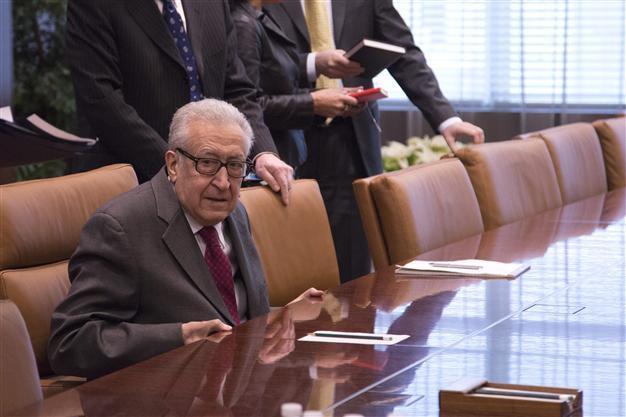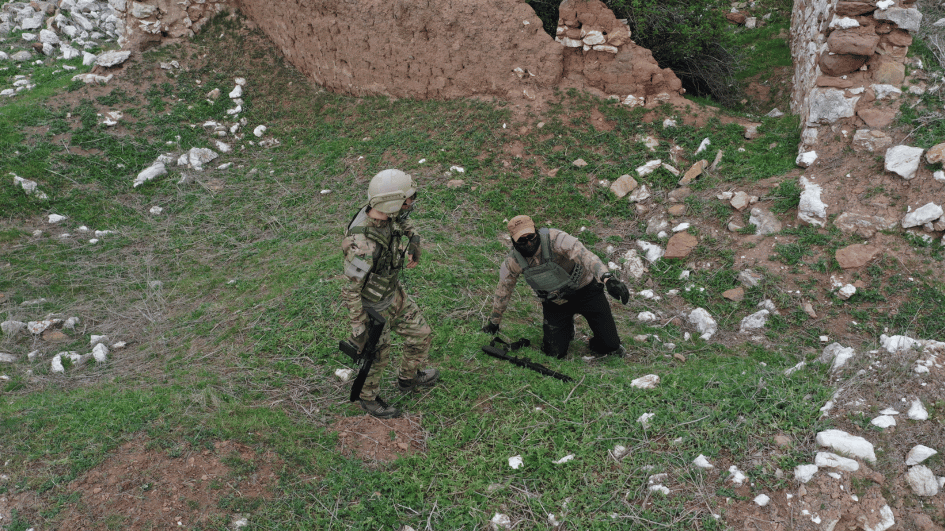Syria breaking up before everyone's eyes: Brahimi
UNITED NATIONS - Reuters

Mr. Lakhdar Brahimi, Joint Special Representative of the UN and the League of Arab States for Syria takes a seat before talks with United Nations Secretary-General Ban Ki-moon, at the United Nations in New York, USA, 21 January 2013. EPA photo
U.N.-Arab League mediator Lakhdar Brahimi warned the U.N. Security Council on Tuesday that Syrian President Bashar al-Assad may be able to cling to power for now but the country is "breaking up before everyone's eyes," diplomats told Reuters.Brahimi appealed to the 15-nation council to overcome its deadlock and take action to help put an end to the Syrian civil war. However, it was not clear whether his latest report, which diplomats said was his bleakest since his appointment last year, would persuade Russia to agree to support concrete U.N. steps to try to halt the bloodshed.
Brahimi suggested that attempts to end the 22-month-old conflict, which has claimed more than 60,000 lives according to U.N. figures, had not progressed in the last two months. He said it was up to the Security Council to end its impasse.
"The country is breaking up before everyone's eyes," Brahimi was quoted as saying by diplomats inside the closed-door meeting. "Only the international community can help and first (and) foremost the Security Council."
"I told the council that I'm embarrassed to be repeating the same thing," Brahimi told reporters after the meeting. "Syria is being destroyed, bit by bit."
He said the principles of a political transition in Syria, agreed to at talks among major world and regional powers in Geneva in June last year, could form the basis for a Security Council plan of action.
"In the Geneva communique the meaning of full executive powers (for a transitional government) must be clarified, but it clearly means that Assad should have no role in the transition," one diplomat quoted Brahimi as saying.
The mediator told the council that Assad may be able to hold onto power for the time being, but that "the Syrian regime's legitimacy has been seriously, probably irreparably, damaged."
Russia has said that insisting on Assad's departure as a condition for peace negotiations between the government and the opposition forces would prevent such talks from ever taking place. The opposition, backed by the United States and much of Europe, has made plain that Assad can play no role in a future Syrian government.
The Security Council has been deadlocked since 2011 over Russia and China's refusal to consider sanctions against Assad's government. They have vetoed three resolutions condemning Assad's attempts to crush what began as peaceful protests inspired by other Arab Spring uprisings.
Moscow has joined the Damascus government in criticizing the United States, France, Saudi Arabia, Qatar and Turkey for supporting the Syrian rebels.
BRAHIMI IS 'NOT A QUITTER'
"There's no obvious way forward," U.S. Ambassador to the United Nations Susan Rice told reporters after the meeting. "I don't have any promises of any big breakthrough."
Brahimi will attend a dinner with the ambassadors of the five permanent Security Council members - the United States, Russia, China, Britain and France - later on Tuesday to discuss ways to end the deadlock, diplomats said.
"I am now calling on the Security Council to take action," Brahimi told reporters.
He also played down rumors that he was planning to resign, though he added that it was not a job he had wanted.
"I'm not a quitter," he said. "The United Nations has no choice but to remain engaged with this problem, whether I'm there or not. The moment I feel that I am totally useless I will not stay one minute more."
Western diplomats said Russia is more concerned with countering U.S. influence in the Middle East and maintaining some level of Russian leverage in the region than it is with protecting Assad.
Brahimi said "unprecedented levels of horror" have been reached in Syria, and that both the government and the opposition forces have committed atrocious crimes.
Highlighting his point about atrocities, opposition activists said at least 65 people had been found shot dead with their hands bound in the northern Syrian city of Aleppo on Tuesday in what they called a "new massacre."
Diplomats said Brahimi has grown extremely frustrated at the inability of the Security Council to unite behind him. His predecessor, former U.N. Secretary-General Kofi Annan, voiced similar frustration when he resigned in August.
British Ambassador to the United Nations Mark Lyall Grant told reporters that he hoped the council could finally overcome its deadlock.
"It is horrendous that the brutality of the regime goes on, the number of deaths is increasing the whole time, and the Security Council is still not able to put its full weight behind the U.N. special envoy's efforts," he said.
The United Nations is not present in all parts of Syria but it is maintaining limited aid operations. It has warned, however, that it needs more money and better access on the ground.
The United Nations will hold a pledging conference in Kuwait on Wednesday to seek $1 billion of aid for Syria's neighbors sheltering 700,000 registered refugees, and an additional $500 million to bankroll humanitarian work for 4 million Syrians inside their country.
Brahimi told Security Council members that the regional outlook was also worrying.
"Syrian factions are getting cross-border support from neighboring countries," a diplomat quoted Brahimi as saying. "Syria is becoming a playground for competing forces. None of the neighbors is immune to the fallout consequences of the conflict."
















